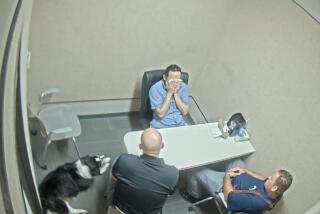Jury Deadlock Ends Peyer’s Murder Trial
- Share via
SAN DIEGO — A Superior Court judge declared a mistrial Thursday in the murder trial of former California Highway Patrol Officer Craig Peyer after being told the jury was hopelessly deadlocked following a month-long trial and seven days of deliberation.
Peyer, accused of strangling San Diego State University student Cara Knott, 20, at an isolated North County freeway off-ramp, showed no emotion when jury forewoman Walnetta Lenhardt told Judge Richard D. Huffman that the jury was deadlocked, 7-5. Jurors later said the 7-5 vote favored conviction.
Juror Victor Dingman told The Times he voted to acquit Peyer and that the jury unanimously agreed that Robert Calderwood, a key prosecution witness, lied in his testimony. Calderwood testified that he saw a CHP patrol car stop a Volkswagen on the Mercy Road off-ramp about the time that Knott was killed. Knott’s car was a Volkswagen.
According to Dingman, the jurors who voted to acquit Peyer also discounted the testimony of Michelle Martin, who testified that she saw Peyer stop a light-blue Volkswagen at the same off-ramp. However, the testimony of Martin proved persuasive to the seven jurors who voted for conviction, Dingman added.
If it hadn’t been for the testimony of Martin, the outcome of the trial probably would have been different, Dingman said.
“If she had not testified, there is no doubt that he would be walking a free man,” Dingman said.
Victim’s Parents Shocked
Dingman said the prosecution’s failure to demonstrate a clear motive for the killing also weighed heavily with the jury.
Samuel and Joyce Knott, parents of the victim, reacted with shock at the jury’s deadlock. The couple’s two other daughters, Cynthia and Cheryl, cried softly when the decision was announced. John Knott, the couple’s only son, cradled his head in his hands as reacted with disbelief.
A relative of the family who arrived moments after the deadlock was announced cried out “How could this happen?” and began to sob.
In a brief statement read to reporters before leaving the courthouse, Samuel Knott thanked the prosecutors “for their dedication and sacred trust to Cara.” Knott also thanked supporters for their “incredible compassion and support through this excruciating ordeal.”
Peyer, a 13-year CHP veteran who was fired after being charged with murder, left through a rear courthouse exit without talking to reporters. His wife, Karen, made her way through a mob of reporters.
“We have no comment,” she said as tears streamed down her cheeks.
Steve Casey, spokesman for San Diego County Dist. Atty. Ed Miller, said that Peyer will be retried.
After declaring a mistrial, Huffman scheduled a bail review hearing for Peyer for next Friday. The case will be sent back to the Superior Court Supervising Criminal Department to receive a new trial date. Peyer is currently free on $1 million bail, for which a $100,000 premium was posted last year as security.
The premium expires next Friday. Normally, bail premiums are renewed annually, and Peyer could be required to post an additional $100,000 premium in order to remain free.
Knott was strangled on Dec. 27, 1986. Police said she was killed on the Old U.S. 395 bridge near Interstate 15 and the Mercy Road off-ramp between 9 and 10 p.m. Her body was thrown 65 feet into a dry creek bed, where it was discovered by San Diego police the next morning.
Circumstantial Evidence
Police homicide investigators theorized that Knott was strangled with a 48-inch-long rope that was recovered from the trunk of Peyer’s CHP car. Deputy Dist. Atty. Joseph Van Orshoven also said that Peyer hit Knott over the right eye with his police flashlight, leaving a dark bruise.
Knott’s car was found half-a-mile from the off-ramp on a dirt road that parallels the freeway, and about three-tenths of a mile from where the body was found.
Prosecutors were unable to prove that Peyer had contact with Knott. Instead, they weaved a circumstantial case built from evidence collected by forensic scientists. Perhaps the most damaging of the evidence was a gold fiber that was one of six microscopic fibers found on items worn by Knott and Peyer the night of the killing.
Fiber experts for the prosecution testified that the gold fiber, which was recovered from Knott’s blood-stained white sweat shirt, matched the gold thread found in the CHP shoulder patches taken from Peyer’s jacket. The fiber had an unusual “rough, pitted, sandblasted appearance,” said one expert.
Another expert testified that the fiber was even more distinctive because of the way it was dyed. The rayon fiber was dyed with yellow granules added at the time of manufacture, a method that was last used about eight years ago, he said. Van Orshoven told the jury that the patches on Peyer’s jacket were at least that old, and possibly 13 years old.
Police forensic scientists also recovered two purple fibers from Peyer’s service revolver and another from his left boot that matched purple fibers in Knott’s purple sweat pants. In addition, two dark-blue fibers found in each of Knott’s hands matched the thread that bordered the CHP patches taken from Peyer’s jacket.
Two tiny blood spots found in a crease in Knott’s left, white leather boot and on the left sleeve of her sweat shirt matched Peyer’s Type A blood, prosecution experts testified. Sophisticated tests that check for genetic markers determined that Peyer was probably the source of the blood spots.
Women Called About Stops
However, Dingman said that jurors did not give much weight to the fiber and blood evidence presented by the prosecution because Van Orshoven failed to tie them directly to Peyer.
“There was not a shred of conclusive evidence presented to show that the blood came from Peyer or that the fibers came from Peyer and Cara Knott,” Dingman said.
After Peyer’s arrest, about two dozen young women called police investigators and prosecutors to say that they had been stopped by him at night on Mercy Road and detained for long periods of time. Most of the women were stopped for minor equipment violations, like a faulty light.
Knott’s car had a defective license plate light when it was recovered by police.
The women said that Peyer never touched them or asked them for a date, but several said that the stops at the darkened off-ramp frightened them and made them uncomfortable.
On the night of the killing, Peyer purchased $5 worth of gasoline at about 9:45 p.m. at a gas station on Kearny Villa Road. Two women attendants testified that they saw scratches on Peyer’s face and he appeared disheveled. Several CHP officers testified that they too noticed the scratches when Peyer was getting off duty at 10:30 p.m. One CHP sergeant said that Peyer appeared to have been in a fight because his uniform was uncharacteristically rumpled.
Both prosecution and defense witnesses portrayed Peyer as a conscientious officer who took great pains to maintain a neat uniform appearance.
Peyer claimed that he suffered the scratches when he slipped on a gasoline spill while filling up his police cruiser at CHP headquarters and fell against a chain link fence, with his face rubbing against it. However, a San Diego police homicide detective testified that Peyer told him that he had scratched himself with his fingernails when he put both hands to his face to protect his fall.
Van Orshoven argued in his closing statement that Knott, who was trained in self-defense, “exploded” and scratched Peyer’s face in a desperate defensive move. The prosecutor said that she became anxious and frightened when Peyer ordered her to park near the isolated off-ramp.
Police criminologists testified that they scraped Knott’s fingernails but found no evidence of blood or skin.
On Thursday, Van Orshoven said that he did not know if he will be reassigned to prosecute Peyer once more.
Diane Campbell, one of two defense attorneys in the case, said that she was happy with the jury’s decision but said that she and co-attorney Robert Grimes remain convinced of Peyer’s innocence despite the jury’s 7-to-5 vote for conviction.
Times staff writers Jane Fritsch, Michael Granberry and Richard A. Serrano contributed to this story.
More to Read
Sign up for Essential California
The most important California stories and recommendations in your inbox every morning.
You may occasionally receive promotional content from the Los Angeles Times.













